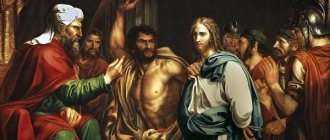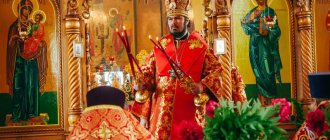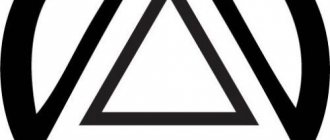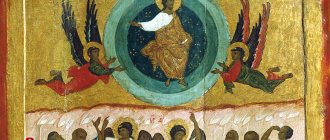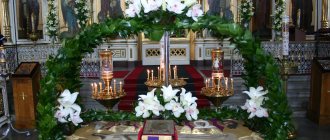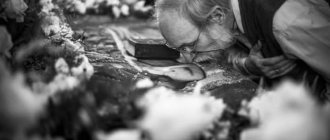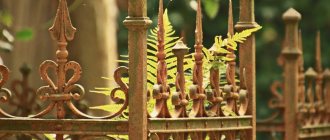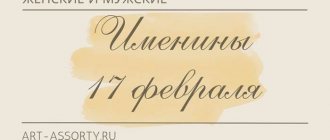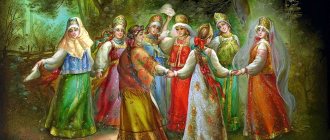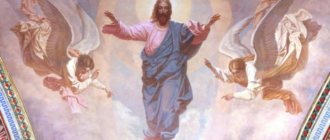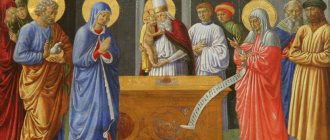Almost every church holiday has not only its own traditions, but also some rules of conduct that are intuitive and therefore do not need any additional description in the form of a “charter” or “law.” However, believers often ask questions - what cannot be done on Easter, why it is believed that nothing can be done around the house and even work, and they want to receive a specific answer.
A detailed commentary on this topic, the opinions of priests and other useful tips can be found in the article.
Do household chores
As on any other significant church holidays, you cannot work on Easter. We are not talking about the kind of work that people go to in order to fulfill their work duties or serve for the benefit of people - we are talking about chores in the garden and around the house. It is also better to refuse work for the sake of money, which can be postponed until another time.
There is no need to cook on Easter - all preparations for the festive table are best completed the day before, on Holy Saturday.
What is strictly prohibited
The Orthodox tradition calmly treats violators. But it is worth considering that deviation from the rules is considered a manifestation of disrespect for the Lord. God, of course, will not take revenge. But it is still advisable to demonstrate respect for the Almighty.
In order not to offend brothers in Christ, you do not need to:
- Sleep until noon. It is supposed to meet the religious procession, if not as part of it, then in a wide-awake state (this is around 4 am).
- Clean rooms, wash and sweep floors, wipe windows.
- Wash, hang clothes, iron.
- Do small household work. You should even prepare your food the day before. On Sunday you can add the finishing touches to dishes and cut salads.
- Swim, go to the bathhouse, sauna. Everything is done on Saturday.
- Sewing, knitting, weaving, spinning and the like.
- Perform cosmetic procedures (you need to wash your face).
- According to legend, “A girl does not braid her hair.” It is forbidden to cut your hair or dye your hair.
- Greed, stinginess, stinginess, excessive prudence. Remember that Christ sacrificed his life for the sake of people. Don't skimp on money or treats.
- Complain, be sad, moan, sink into despondency. We must rejoice at such a bright event - the resurrection of Jesus Christ from the dead (miracle).
- Quarrel, start a showdown, be rude, use profanity.
- Working hard unnecessarily. Everything possible is put off until later.
- Dig, plant, water. Garden work is carried out, but if there really is no other time.
- Repair or rearrange furniture. Renovate housing.
- Shedding living blood. Hunting and fishing are left until better days.
If the scheduled work falls on an Orthodox Sunday, then this is not a sin. It is better to refuse initiative work.
Use foul language and swear
Easter (May 2) is a good and bright holiday, on which you should try to bring light to people and do good deeds. You can invite guests to your home, treat them, and make them happy.
There is no need to swear or sort things out; foul language is also prohibited. Don’t spoil the mood for yourself or those around you; try not to talk about unpleasant topics on this day. It is especially important to maintain a warm, calm atmosphere in the family.
But believers should not forget that Easter is not 24 hours, but a whole week - Bright Week.
Is it possible to light alcohol
Nowadays, all available food is collected in the Easter basket. Father doesn't know what's in anyone's possession. Church-goers refuse alcohol. They believe that a bottle of alcohol has no place in a basket.
For the sake of the holiday, the priest will bless what you bring. Sometimes priests remind us of the sin of alcoholism. If you take drinks in moderation, nothing bad will happen.
It is better to replace the wine with salt. It is more useful to have consecrated crystals at home. They flavor food and use it to protect against the evil eye and spoilage.
Laying a dirty tablecloth on the table
The Easter table is not only Easter cakes and colored eggs, but also its proper design. And we're not talking about decor.
Be sure to make sure that on May 2 the table is covered with a snow-white, perfectly clean tablecloth. Stains and dirt on it promise misfortune in the family, tears and troubles.
“We are still friends”: Derevianko commented on the breakup with his wife
It’s good to wash often: myths about shampoo and hair care that only harm
Women's jeans: before you buy them, you need to pay attention to one detail
Easter signs and beliefs
Some lucky coincidences point to things to come. Some consider them superstitions. But the information has been collected for thousands of years. And there were no complaints. Usually the sign hits the mark.
If you want to improve your own everyday life, then do not stop at beliefs. Trust in God, and don’t make a mistake yourself - they say.
Signs for money and wealth
Success and prosperity attract the following behavioral skills:
- A richly laid festive table.
- A white, expensive tablecloth, reserved especially for the celebration.
- Alms to the poor after the service, which includes dyes.
- Meeting the first rays of sunshine on your feet. Or better yet, as part of a church procession.
- Noticing a bright, colorful sunset is a sign of great luck.
- Feeding wild birds is a sign of successful professional fulfillment.
Collect the crumbs from the table and throw them after the departing guests. It is believed that the Lord will restore the costs with interest.
The following actions will lead to poverty:
- Touching bills and coins with dirty hands means poverty.
- Taking out the trash means giving away your wealth.
- Occupation is prohibited throughout Holy Week. And you are not supposed to borrow money yourself.
Hearing the sound of a woodpecker in the forest means finding your own home. Anyone who quietly steals some small item from a person praying will steal with impunity. If you are lucky in the game with Easter eggs, you can go looking for treasure. Good luck will follow.
If you haven’t seen any harbingers of a happy future, then read the money plot...
For love
The girls performed a special ritual. I need to embroider a towel for the Easter service. The Easter cake was wrapped and illuminated in it. They gave it to the first man they met. If he took it without talking, his betrothed will meet very soon.
Other love superstitions:
- An itchy eyebrow means meeting your future husband.
- It hurts to hurt your elbow - my little one is sad.
- Lips itch - for kisses.
- The left eye itches - to laughter, the right - to tears.
Beliefs about marriage
A girl of marriageable age should run around among the guests. If he tastes 12 Easter cakes baked by different housewives, it means that the marriage will bring happiness.
Ask in church:
Resurrection of Christ, give a single groom!
The following events predict a wedding:
- A bug, a fly in a festive plate.
- Cuckoo singing. Following the wedding, the first-born will appear.
The croaking of crows bodes ill. The loved one will find another. The lonely one will have to endure the bitter burden for a long time. Sleeping through the all-night vigil means staying as a girl or going out for a drink.
A wedding on Krasnaya Gorka means unclouded happiness.
To your health
A heroic organism is a profitable business. Don't miss the moment when you can patch it up:
- Wash yourself with crystal water from a clean well, stream, spring. Diseases will recede.
- Ring the bells. Ask for health to your friends and yourself, your loved one.
- Place a bouquet of willow in the nursery. Illnesses will not affect children.
Seeing a deceased person in a dream is a great sign. A relative signals that he is taking care of blood relatives. No one will be seriously harmed. The stranger hints at the covering of a guardian angel.
For the weather
Peasants have long noticed the relationship with certain natural phenomena. They were concerned about productivity. Plenty of grain and livestock means prosperity all year long.
Rain means:
- slushy spring;
- cool summer if the sky is overcast;
- an abundance of herbs if it rains.
A thunderstorm foreshadows a warm, mild autumn. Flashes of lightning and thunder for a week - early cold weather.
Snow:
- melted - unprecedented grain harvests;
- went - to great achievements.
The frost hit - a long hot, dry period.
Cloudy skies - for cool July and August; it's clear - it's going to be hot.
For pregnancy
Childless couples also followed the events of the pre-holiday period. Coincidences warn of impending conception:
- east wind - to multiple births;
- inadvertently place an extra plate on a rich table;
- bump into paint with a baby;
- eat an apple sprinkled with blessed water; see a lot of lost hair on the comb.
A request for a first-born child, expressed from the heart, is sure to come true. Pray to the Lord for the gift of pregnancy.
Bad signs
The following prophesies a bad fate:
- If the baked goods are cracked or if the baked goods do not rise - unfortunately.
- The dishes broke - to the death of relatives.
- To be late for a service means to be mired in failure.
- The candle goes out - sins are not allowed. Correct yourself immediately.
- Dogs barking is a sure sign. To the east - to the fire; to the west - to disaster.
- Fighting means illness.
- Offending the weak leads to a bad streak.
To minimize the effect of bad omens, you need to cleanse yourself of damage. Ordinary people turned to healers.
Go to the cemetery
A visit to a cemetery also cannot be accompanied by joyful emotions. For this reason, it is not recommended to go on a bright holiday to places that have become the last refuge for people close to the heart.
You can visit the graves a little later, especially since there is a special day for this - Radonitsa, which occurs on the Tuesday immediately following Easter week. It is at this time that believers traditionally go to the cemetery, clean it up, pray and order funeral services for the souls of loved ones and relatives.
Found a violation? Report content
What to do for Easter: what you can do
The festive mood itself dictates the order of actions. Today you need:
- For a believer to attend the all-night service. This begins in every Orthodox church the night before. And in the morning people bring provisions for the priest to bless.
- Rejoice, have fun, read spiritual texts.
- Pray for the living and the dead. To ask for the kingdom of heaven for souls.
- Visit your parents with gifts. Traditionally, offerings are prepared for the festivities to loved ones; the old, the poor, and the sick are not forgotten.
- Treat everyone indiscriminately with blessed Easter cakes and eggs.
- Engage in charity of any kind. It's good to do something good for orphans, people with disabilities, and lonely people.
In the morning, the spouses are supposed to kiss Christ (kiss three times). It is believed that pure kisses will keep quarrels, discord, and angry disagreements away from home.
Festive events are organized in the villages. Go if you feel like it. Or spend time with those closest to you. Connect online with those you cannot visit. The main thing is to remain calm, complacent, and confident in the future. The believer relies on the Lord, who will not leave him in misfortune. Leave your doubts and enjoy the festivities.
Festive feast: rules and restrictions
The morning breaks Lent. You can break your fast. This means it’s time to enjoy previously forbidden dishes. They bring everything to the table that is limited to:
- meat;
- sausages;
- pickles and smoked foods;
- fish;
- eggs; sour cream;
- butter;
- sweet.
The first meal is blessed dyes and pieces of Easter cake. Then everything that darling requires. Housewives make rich pies and cakes, meat treats, fish pies, sauces and much more in advance.
Alcohol is also not prohibited. Red Cahors is a suitable drink for breaking the fast. But it is better to abstain from heavy libations. Drunkenness is a sign of disrespect.
Egg shells and leftovers should not be thrown in the trash. Must be carefully assembled. The shells are suitable for fertilizing plants. And the leftover food is buried in the ground.
Live broadcast of the service on Easter night
For all our believing readers, we will broadcast live from two churches in the city. The live broadcast from the Trinity-Izmailovsky Cathedral starts at 23:15, and from the St. Nicholas Naval Cathedral - at 23:30. Look on the main page of NEVSKY NEWS.
Happy Easter to you!
Federal News Agency /
What date is Easter celebrated in 2022?
In 2022, for Orthodox Christians it falls on 01.01. It is preceded by Lent. Easter itself is not just a festive Sunday and not even just the Bright Week that follows it. The most majestic and solemn holiday celebrated by the Orthodox Church actually lasts 40 days, until the next significant day - the Ascension of the Lord. The day before this, the completion of Easter celebrations takes place; the last Easter service before the Ascension is the celebration of Easter. In Belarus, the Resurrection of Christ and all the holidays associated with it fall on the same dates as in Russia.
On May 1, 2022, Fomino Sunday (Antipascha, “instead of Easter”) is celebrated. I remember the story of the Apostle Thomas, for whom the Feast of the Resurrection came somewhat later, when he was able to see the risen Lord himself. From this date, the time for weddings in the church begins again, which stopped with the onset of Lent.
How to tell fortunes on the first person you meet
When you leave your apartment in the morning, remember the identity of the person you saw. He prophesies this:
- Man - successful resolution of difficulties.
- A woman is luck.
- Lady with a stroller - wish fulfillment.
- Girls - for reciprocity in love.
- A dog is a short-term nuisance without significant consequences.
- Cat - unexpected money. Black - patronage.
- A bird knocks on the window - the desired news is already on the way.
Good energy extends to Easter week. Take a closer look, observe. Good things will definitely come true. And forget the bad. Let it pass by.
Work, but only in moderation
You can eat and drink anything during the week, including alcohol, but without much effort. If it is difficult to stop and control yourself after drinking a glass, it is better not to bring this glass to your mouth. It is enough to rejoice and have fun spiritually.
Whether to work or not does not depend on the parishioner. Easter Sunday is a day off; you can and should go to church and congratulate your loved ones on the holiday. If a believer has a flexible work schedule, he will have to work, but there is nothing wrong with that. And you shouldn’t be sad that you’ve only had a work shift of maybe five minutes. Sewing, knitting, and cleaning the house is not recommended, but there is no prohibition as such. It would just be nice to spend these days with family, and not do spring cleaning on holidays.
You can work around the house on any other days, but everything should be reasonable. You can give testicles, they are a symbol of eternal life. But for all the encouragement to have fun, you shouldn't end up with dirty dishes piling up in the sink during the week. But there is no need to scold your household or get angry with them if you suddenly didn’t wash it after yourself. It is better to leave it overnight than to experience negative emotions.
How to calculate the date of Easter: why it is celebrated on different days
Easter is a transitory holiday; every year it falls on different, sometimes widely separated, dates. This happens because it is impossible to celebrate the Resurrection of Christ before the onset of Passover - the Jewish holiday on the day of which the Savior was crucified. And the Jewish clergy were accustomed to counting their holidays according to the lunar calendar, which does not coincide with the solar calendar by about 11 days. In addition, Easter celebrations must certainly take place on Sunday. Because of this, all other holidays associated with Easter also become transitory, celebrated each time on different days. For example, Trinity. It is also called Pentecost because it is celebrated on the 50th day after the Resurrection of Christ.
Initially, there was a lot of controversy about when exactly it was correct to celebrate Christian Easter. It was celebrated on the first Sunday after the 14th of the month of Nissan (Jewish Passover) or on its day itself. The First Ecumenical Council put an end to the discord, determining that Easter should be celebrated after the Jewish one. To do this, you need to choose the first Sunday after the full moon, but always either on the day of the spring equinox or after it. This is how the Russian version of the Easter holiday is counted these days. The same is done in Belarus.
Easter and Easter cake: why are they confused?
If everything is more or less clear with colored eggs, other obligatory dishes for Easter have created confusion.
On the eve of the long-awaited spring holiday, retail outlets attract delicious baked goods called “Spring Cupcake” and “Easter Kulich”. Often such products are called Easter cakes, but in fact they are Easter cakes.
They are baked from rich dough, not sparing butter, raisins, candied fruits - gastronomic “luxuries” accumulated during a long fast. The custom was preserved in memory of the bread from the meal that Christ shared with his disciples.
The top of the Easter cake is decorated with a crown of thorns, a cross or the letters XB.
The dish called Easter is not a pastry. This is a raw or custard dessert made from cottage cheese (selected, full-fat), sugar, butter with the addition of raisins, candied fruits, and condensed milk.
In liturgical books it is listed as “milky thickened.” It is important to give Easter the shape of a truncated pyramid, symbolizing Mount Golgotha, where Jesus was crucified. To do this, use a bean bag, such as in the photo.
Easter confusion partly occurred due to the confusion of Russian and Ukrainian names. Ukrainians have long called Easter baked goods paska, and the cottage cheese dish – cheese paska.
History of Orthodox Easter
The word “Easter”, or “Passover”, translated from Hebrew is interpreted as “passing”, “passing by”, which reflects the essence of the Old Testament holiday associated with the exodus of the sons of Israel from Egypt. The Resurrection of Christ is connected with the celebration of the Jewish Passover not only by its common name, but also by a continuous chain of symbolic meanings. During the celebration of Passover, baked meat of a sacrificial lamb (lamb or kid) is eaten. This is done in memory of the tenth plague of Egypt, in which all the firstborn died. In order for the punishing angel to pass by the houses of the Israelites and not strike their firstborn, it was important to anoint the door lintels and doorposts with the sacrificial blood of a lamb. Since then, the same date has been celebrated as the deliverance of the Israeli people, their liberation from Egyptian slavery. This is accompanied by a ritual meal - lamb meat with bitter herbs, reminiscent of the bitterness of slavery, and a sweet salad, speaking of the sweetness of freedom.
Easter of Christ is much more than the liberation of just one people from slavery. In it, Christ, like the New Testament lamb, himself took the place of the sacrifice that atoned for human sins and provided a way out of “spiritual slavery.” Thus, the old Easter was replaced by a new Easter. The temporary old (old) union of God with the people of the Jews became obsolete, abolished, and was replaced by a new union with all people, all humanity. On his last celebration of Easter, Jesus Christ, predicting his death, gave a new understanding of the Easter meal - the Eucharist.
